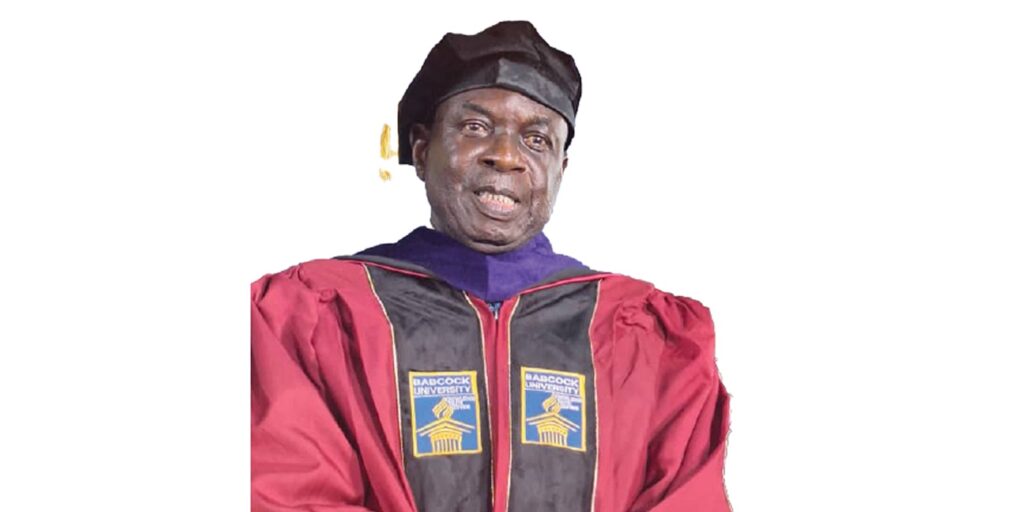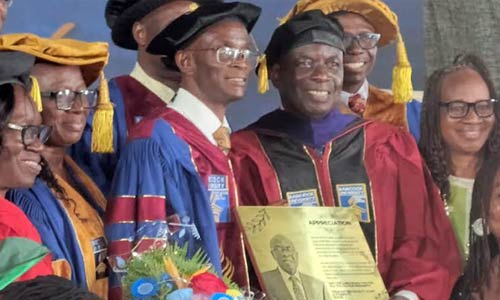When Dr Frederick Bolaji walked across the stage at Babcock University’s convocation this year, the applause wasn’t just for another PhD holder. It was for a man who, at 71, had defied time, circumstance, and even his father’s early discouragement to pursue the law degree he once thought impossible.
His journey—from a small missionary town in Kogi State, through a high-flying banking career, to enduring 65 harrowing days on the bare floor of a police cell—reads like a novel. But for Bolaji, it’s simply the story of his life: a long arc of resilience, reinvention, and relentless learning.
Table of Contents

Early Roots in Egbe
Bolaji hails from Egbe in Yagba West Local Government Area, a town famed for its missionary heritage and the historic ECWA Hospital. The second child of his mother, he started his education in his hometown but quickly encountered the kind of hardship that leaves lasting marks.
“I initially gained admission into Egbe Secondary School, one of the best in northern Nigeria then,” he recalled. “But my parents couldn’t afford the fees. I stayed home for three years.”
Eventually, he joined Eruku Commercial Secondary School in present-day Kwara State, becoming part of the pioneer set. That meant helping to build the school from scratch—making blocks, fetching water from distant villages, and farming. Despite limited resources and teachers, he excelled, moving on to Kwara State College of Technology for A-Levels, before earning a degree in Economics from the University of Ibadan.
Rising in the Banking Sector
After his NYSC at Kagoro Secondary School in Kaduna State, Bolaji joined the International Bank for West Africa, later known as Afribank Nigeria PLC. Over the years, the institution would morph through mergers and takeovers—from Afribank to Mainstreet Bank, Skye Bank, and finally Polaris Bank.
By the time he was Deputy General Manager, Bolaji had seen enough of the politics and questionable ethics that had begun to corrode the sector. “Some of those who rose quickly in banking deserved a thorough investigation,” he said. “The industry is where many of Nigeria’s deeper problems began—and remain.”
Despite being urged by new investors to stay, he made the rare decision to voluntarily retire. “It was time to build something of my own,” he said. That decision shocked colleagues, but it marked the start of his legal journey.
From Boardroom to Classroom
While still in banking, Bolaji enrolled at Lagos State University to study law. Lectures were mostly on weekends, and he often missed Fridays due to work, making up with extra tutorials. “Some full-time students became my tutors,” he smiled. “Many are still my friends today.”
After completing his LLB in 2004, he attended the Nigerian Law School in Bwari, Abuja, taking a study leave without pay from Afribank. He was called to the Bar in 2005 and returned briefly to banking before retiring in 2006 to establish his own law practice.

The 65 Days That Changed Everything
The real turning point, however, came years earlier when he was the Branch Manager of Afribank’s Apapa branch. Some of his foreign clients—Indian and Chinese businessmen—got entangled in disputes with bank directors. The matter escalated to the police under the Nigeria Interpol CID.
Bolaji was falsely implicated after an individual allegedly swapped another staff member’s name for his in documents. Despite memos showing he had distanced himself from the questionable transactions, he was arrested alongside senior executives.
“I spent 65 days at Alagbon, sleeping on a bare floor,” he recounted. “We were caught in a power struggle between the bank’s board chairman and the managing director. We became scapegoats.”
That injustice reignited his suppressed passion for law. “I wanted to understand the system and defend others like me,” he said. “When I was released, the first thing I did was find out where I could study law without disrupting my work.”
A Career of Reinvention
After banking, Bolaji’s expertise saw him return briefly to the corporate world—this time at Bank PHB (now Keystone Bank) as Executive Director of Operations, Branch Management, and IT between 2010 and 2011. He later qualified as both a chartered accountant and a certified banker, earning fellowships with the Institute of Chartered Accountants of Nigeria and the Chartered Institute of Bankers of Nigeria.
He also became a member of the Chartered Institute of Arbitrators, specialising in international investment arbitration—an area where he hopes to support Nigeria’s foreign direct investment engagements.
Breaking Age Barriers at Babcock
At Babcock University, Bolaji didn’t just earn his PhD—he became the oldest graduate in his cohort. “I only found out on convocation day,” he laughed. “Another colleague was born in 1954 like me, but I was born in January. That made me the oldest.”
His disciplined daily routine helped him balance work and study: reading in the early hours, watching the news, and keeping a well-equipped office library. “I read virtually every day,” he said.

On Law, Learning, and Nigerian Potential
Contrary to popular belief, Bolaji doesn’t see law as a cumbersome course. “It’s as straightforward as any other discipline if you commit yourself,” he said, noting that much of the archaic Latin and Greek legal jargon has been phased out globally.
His philosophy extends beyond personal achievement to a firm belief in Nigerian talent. “Nigerians are excelling everywhere—healthcare, academics, music, technology,” he said. “With the right environment, we can achieve anything, even space travel.”
He cautions against entitlement: “Nothing comes cheap, not even respect. You earn it through discipline, consistency, and hard work.”
Looking Ahead
Bolaji’s story is one of grit, adaptability, and lifelong learning. From being a victim of corporate politics to becoming a lawyer and scholar, he has turned setbacks into stepping stones. Today, he continues legal practice, consults in arbitration, and mentors younger professionals.
“Nigerians are not lazy or dull,” he concluded. “We are intelligent, resourceful, and ready—if given the right tools—to change the world.”
Join Our Social Media Channels:
WhatsApp: NaijaEyes
Facebook: NaijaEyes
Twitter: NaijaEyes
Instagram: NaijaEyes
TikTok: NaijaEyes
READ THE LATEST EDUCATION NEWS







































